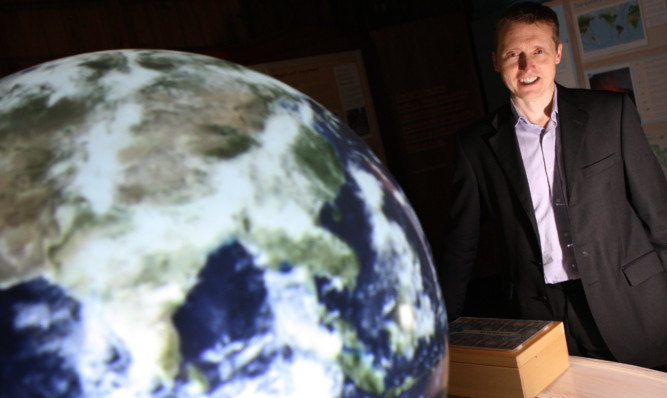On-going bouts of extreme weather have fuelled fresh debate on whether the conditions are down to man-made climate change or natural weather cycles.
The relevance of that debate, and other geographical issues such as mass migration from the Middle East to Europe should mean that geography is a thriving subject in our schools.
And yet according to the Perth-based chief executive of the Royal Scottish Geographical Society (RSGS) Mike Robinson, the subject is “starting to struggle” in the classroom.
A combination of “stress” experienced by teachers implementing the Curriculum for Excellence, unprecedented local authority budget cuts and an inaccurate public perception of geography are all taking their toll.
And that should be a deep cause for concern, according to Mr Robinson.
“Geography is popular in schools. It does quite well. But it is starting to struggle,” the 49-year-old father-of-three told The Courier in an interview at the RSGS offices in Perth.
“I have very deep concerns about the narrowness of subject choice in schools at the moment.
“We did our own survey of 315 geography teachers around Scotland along with the Scottish Association of Geography Teachers and found that nearly 60% of schools are only studying five or six Nat 5s, which is the old O Grade or GCSE.
“Geography is the seventh most popular subject. So if pupils have only got five or six subject choices, you can see where this is going. And we’ve found some schools that have stopped doing geography above S3. We’re not very happy about that because we think it’s an incredibly current subject.”
Mr Robinson said part of the problem lay with the delivery of the controversial Curriculum for Excellence and the lack of support for teachers to implement the “stressful” change, evidenced this week by the headlines about record teacher illness and absences.
He said: “Partly as a consequence of that stress, and partly because of budget cuts, schools have tried to react by cutting the number of subject options available to pupils.
“And so, what you are ending up with, is 60% of schools choosing to study at Nat 4/Nat 5 roughly the same number of subjects you’d normally take at Higher. Now that’s very narrow, and I don’t believe is in the best interests of school pupils. We are greatly constraining their options.
“Of course it’s very early doors, but the pressure from local authorities is to push the numbers down. “The pressure is to do fewer subjects because they can save teachers and ultimately save some money. It’s a bit of a perfect storm. There’s the element of budget pressure facing local authorities along with introducing a new curriculum, the first two or three years of which were always going to be harder. And when you combine all those factors, it’s starting to have an impact, and I don’t think it’s a positive one.”
Mr Robinson said the other aspect is the public perception of geography.
“I had a guy here to fix the windows, “he laughed, “after somebody had thrown a bottle of Buckie through the window. The glazier walked in the door and was here 10 seconds and he said ‘Geography Society is it? “What is the capital of Ecuador? And I thought, ‘yeah, fair play to you, but that really isn’t geography. ‘ “
The Royal Scottish Geographical Society is primarily an educational charity. Its role is to inspire people to want to know more about the world and understand issues more fully, and to provide an objective voice.
“One of the things about geography is that it’s good at joining the dots, “added Mr Robinson, who has been in post for seven years having previously worked with RSPB Scotland and the Royal Botanic Gardens in Edinburgh.
“Our more recent members’ magazines have been on issues like flooding and why it is happening and what we can do about it. Another was on conflict and why we (the British military) were in Afghanistan at all. We did a magazine on (Scottish) independence where we tried to take a completely non-partisan view.
“We did one on the prevalence of animal-transmitted disease to humans (from Aids to malaria).
“Again, these are things that are in the news all the time alongside things like climate change or energy or soil or Scottish mountains and everything else in-between. This is geography. There’s not a day goes by that I cannot pick up the newspaper and see a key geographical story in there. And migration is a classic case in point the subject of our latest magazine.
“Sometimes it is helpful to get a scale of the bigger picture and contextualise issues. Our role is to help in that process. It’s our job to help people realise that this stuff is interesting and to inspire them to think about the world and how they can make a difference.”
A Scottish Government spokesperson said: “The study of geography is and always will be a fundamental part of the broad general education that all children are entitled to.
“Curriculum for Excellence was introduced as a modern and flexible way for pupils to learn and gain the skills and qualifications they need in later life. While there are still clear expectations about how children should progress in their learning, teachers, head teachers and education professionals rightly decide what is taught in Scotland’s schools. Due to Curriculum for Excellence, they have more flexibility to do so.
“We continue to invest in our teaching profession, maintaining teacher numbers nationally this year and have committed funding to do so in 2016-17.”
